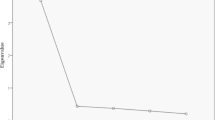Abstract
There is a dearth of studies exploring spiritual attitudes of medical students from developing countries and its relationship to anger. This study was conducted to assess spiritual attitudes and their relationship with anger in a set of medical students in southern India. In this cross-sectional observational study, medical students who were undergoing clinical rotations were offered participation. Selected demographic data were obtained. The participants were rated using the Spiritual Attitudes Inventory [SAI, which comprises of Duke Religiosity Index, Existential Well-Being Scale (EWBS), Negative Religious Coping and Multidimensional Health Locus of Control scale] and State and Trait Anger Expression Inventory 2. Out of 98 students approached, 82 participated (response rate 83.6 %). The mean age of sample was 20.7 years (±0.9 years) with a slight preponderance of females (54.9 %). SAI scores correlated well significantly with subscale scores. Gender had no difference on the SAI or subscale score. Differences were found between self-reported religion and EWBS scores (Kruskal–Wallis χ 2 = 8.891, p = 0.012). Total SAI score had a significant negative correlation with state anger, trait anger and anger expression. High levels of spirituality may be correlated with lower levels of state anger, trait anger and anger expression in medical students.

Similar content being viewed by others
References
Bufford, R. K., Paloutzian, R. F., & Ellison, C. W. (1991). Norms for the spiritual well-being scale. Journal of Psychology and Theology, 19, 56–70.
Carlozzi, B. L., Winterowd, C., Harrist, R. S., Thomason, N., Bratkovich, K., & Worth, S. (2010). Spirituality, anger, and stress in early adolescents. Journal of Religion and Health, 49(4), 445–459. doi:10.1007/s10943-009-9295-1.
Chaplin, W. F., Davidson, K., Sparrow, V., Stuhr, J., Van Roosmalen, E., & Wallston, K. A. (2001). A structural evaluation of the expanded multidimensional health locus of control scale with a diverse sample of caucasian/european, native, and black canadian women. Journal of Health Psychology, 6(4), 447–455. doi:10.1177/135910530100600407.
Chuengsatiansup, K. (2003). Spirituality and health: An initial proposal to incorporate spiritual health in health impact assessment. Environmental Impact Assessment Review, 23, 3–15.
Diong, S.-M., & Bishop, G. D. (1999). Anger expression, coping styles, and well-being. Journal of Health Psychology, 4(1), 81–96.
Hill, P. C., Pargament, K. I., Hood, R. W., McCullough, M. E, Jr, Swyers, J. P., Larson, D. B., et al. (2000). Conceptualizing religion and spirituality: Points of commonality, points of departure. Journal for the Theory of Social Behaviour, 30(1), 51–77.
King, M. B., & Koenig, H. G. (2009). Conceptualising spirituality for medical research and health service provision. BMC Health Services Research, 9(1), 116.
Koenig, H. G., & Büssing, A. (2010). The Duke University RELigion index (DUREL): A five-item measure for use in epidemological studies. Religions, 1(1), 78–85.
Koenig, H., Parkerson, G. R, Jr, & Meador, K. G. (1997). Religion index for psychiatric research. The American Journal of Psychiatry, 154(6), 885–886.
Levenson, M. R., Aldwin, C. M., & Yancura, L. (2006). Positive emotional change: mediating effects of forgiveness and spirituality. Explore (New York, N.Y.), 2(6), 498–508. doi:10.1016/j.explore.2006.08.002.
Paloutzian, R. F., & Ellison, C. W. (1982). Loneliness, spiritual well-being, and the quality of life. In L. A. Peplau & D. Perlman (Eds.), Loneliness: A sourcebook of current theory, research and therapy (pp. 224–237). New York: Wiley Interscience.
Pargament, K. I., Koenig, H. G., & Perez, L. M. (2000). The many methods of religious coping: development and initial validation of the RCOPE. Journal of Clinical Psychology, 56(4), 519–543.
Spielberger, C. D. (1999). State-Trait Anger Expression Inventory-2: STAXI-2. Florida: Psychological Assessment Resources.
Wallston, K. A. (2005). The validity of the multidimensional health locus of control scales. Journal of Health Psychology, 10(5), 623–631. doi:10.1177/1359105305055304.
Conflict of interest
The authors declare no conflicts of interest.
Author information
Authors and Affiliations
Corresponding author
Rights and permissions
About this article
Cite this article
Kattimani, S., Sarkar, S., Bharadwaj, B. et al. An Exploration of the Relationship Between Spirituality and State and Trait Anger Among Medical Students. J Relig Health 54, 2134–2141 (2015). https://doi.org/10.1007/s10943-014-9933-0
Published:
Issue Date:
DOI: https://doi.org/10.1007/s10943-014-9933-0




